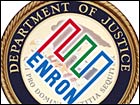
WASHINGTON (CNN) - Sen. Dianne Feinstein of California said Monday she wants the Justice Department to investigate whether Enron Corp. committed fraud in its dealings in that state.
Documents released by the Federal Energy Regulatory Commission prompted her request.
"My suspicions have been high for some time that Enron was fraudulently manipulating the California energy market for its own benefit," she said in a statement. "To that end, in the wake of this new information from FERC, I am asking the attorney general to pursue a criminal investigation to determine whether in fact federal fraud statutes or any other laws were violated by Enron."
Among the documents released by FERC was an Enron memo that discussed a strategy of sending "excess generation" into the energy system, creating congestion, and then being paid by the California Independent System Operator to ease the congestion by transmitting energy in the opposite direction.
"It can often be profitable to sell energy at a loss just to collect the congestion payment," the memo said.
The same memo, dated Dec. 6, 2000, also outlined a strategy called "death star" that makes money by scheduling -- but not moving -- energy in the opposite direction of congestion; for instance, "north in the summertime and south in the winter."
Enron has been accused of taking advantage of California's energy crisis early in 2001 to increase revenue.
"Through the course of the crisis in California," Feinstein's statement said, "the total cost of electricity soared from $7 billion in 1999 to $27 billion in 2000 and $26.7 billion in 2001. And now, as we learn more about Enron's trading practices, it is becoming increasingly clear that there were not adequate safeguards to protect California consumers."
"These new documents point out a number of troubling strategies utilized by Enron, including 'death star,' which is described as a system by which Enron would get paid for moving energy to relieve congestion without actually moving any energy or relieving any congestion," she said. "Obviously, further investigation is needed. But what has come to light so far further demonstrates the need for adequate oversight and regulation of the energy marketplace and for prosecution if it is determined any laws were broken."
Another practice, called "ricochet,'' may have allowed Enron to send power out of California and then resell it back into the state to avoid price caps that applied to transactions solely within California.
| |
 Related Links
Related Links
| |
| | |
| | |
|
"To us, this is really the smoking-gun memo,'' said Sean Gallagher, a staff attorney with the California Public Utilities Commission. "It's Enron's own attorneys admitting that Enron is manipulating the California market.''
Steve Maviglio, a spokesman for California Gov. Gray Davis, said the memos are more evidence that federal energy regulators should order power companies to refund billions of dollars in exorbitant electricity sales.
Neither Justice Department nor Enron officials could be reached for immediate comment.
FERC posted the memos on its Web site, along with a letter to Enron seeking more information about the company's electricity and natural gas trades in California and other Western states.
Robert Bennett, a Washington attorney who represents Enron, said the memos became known 10 days ago and easily could have been kept confidential, but that the company wanted to do the "responsible thing" by releasing them.

--from staff and wire reports
|

